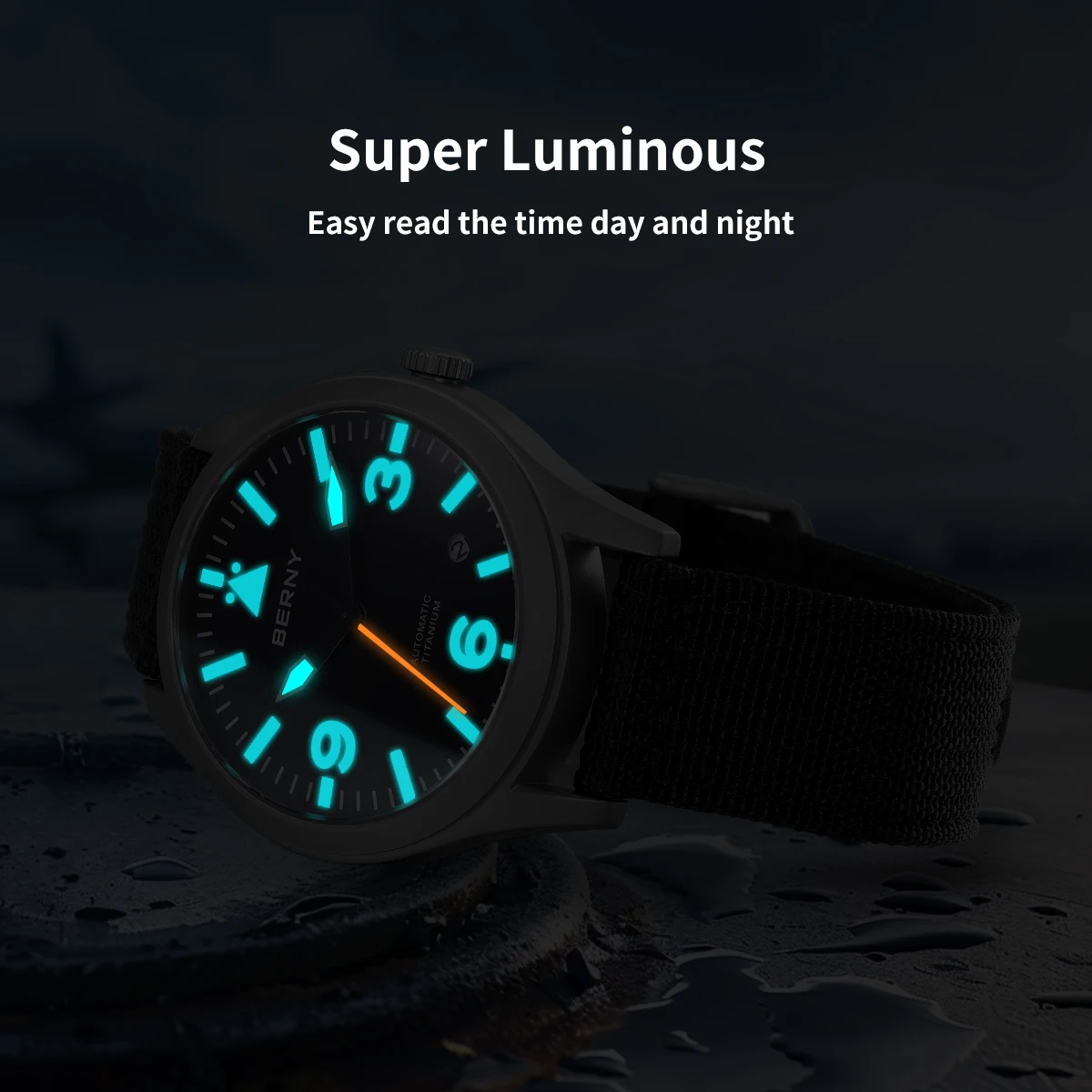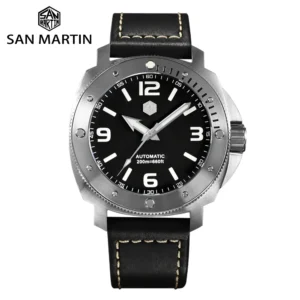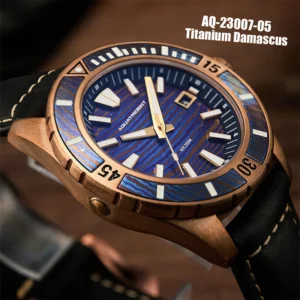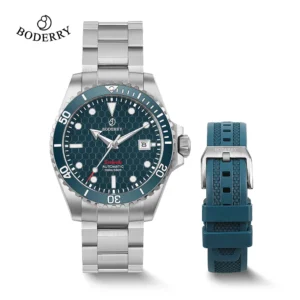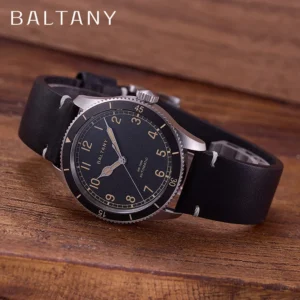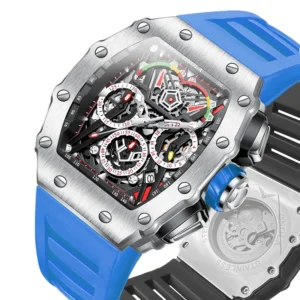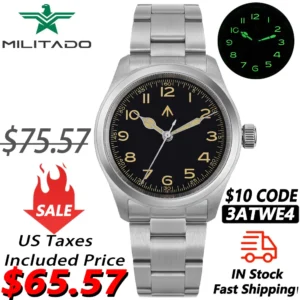1. Introduction: The Rising Popularity of Titanium Watches
In the world of fine timepieces, titanium watches have steadily gained recognition and appreciation among both casual wearers and serious collectors. These lightweight marvels represent a perfect blend of modern materials science and traditional watchmaking craftsmanship, offering a compelling alternative to conventional watch metals.
What makes titanium watches particularly appealing is their unique combination of desirable properties:
- Remarkably lightweight construction (nearly half the weight of steel)
- Impressive strength and durability for daily wear
- Hypoallergenic qualities ideal for sensitive skin
- Distinctive matte gray appearance that stands apart from other metals
This comprehensive guide aims to provide you with a balanced analysis of titanium watches’ advantages and disadvantages, helping you determine if this material aligns with your preferences and lifestyle. Whether you’re considering your first premium timepiece or adding to an established collection, understanding the true nature of titanium watches will empower you to make an informed decision.
The growing adoption of titanium in watchmaking follows a fascinating trajectory within horological history and engineering, transforming from an aerospace novelty to a mainstay in premium watch collections. Beyond the basics, exploring the full range of titanium’s properties and benefits reveals why this material has captured the attention of discerning watch enthusiasts worldwide.
2. What Makes Titanium Special as a Watch Material?
Titanium (element symbol Ti, atomic number 22) stands out as a transition metal with extraordinary physical and chemical properties that make it ideal for specialized applications. In watchmaking, these properties translate into meaningful benefits for the wearer.
The most remarkable characteristic of titanium is its exceptional strength-to-weight ratio. With a density of only 4.5 g/cm³ compared to stainless steel’s 7.9 g/cm³, titanium achieves nearly half the weight while maintaining comparable or superior strength. This makes lightweight and strong titanium watches particularly comfortable for all-day wear.
Beyond its lightweight nature, titanium offers:
- Extraordinary corrosion resistance due to a naturally forming oxide layer
- Complete biocompatibility with human tissue (used extensively in medical implants)
- Low thermal conductivity, creating a “warm” feeling against the skin
- Natural silvery-gray appearance with a distinctive matte finish
- Non-magnetic properties beneficial for watch movement accuracy
Titanium’s journey from aerospace applications (where it remains crucial in aircraft and spacecraft construction) to premium watchmaking illustrates its versatility. While initially challenging to machine and finish, advances in metallurgy and manufacturing have made titanium increasingly viable for intricate watch components.
Perhaps most notable is titanium’s unique tactile experience. Unlike steel watches that can feel cold against the skin in winter months, titanium’s low thermal conductivity means it quickly matches body temperature, creating a more comfortable wearing experience regardless of conditions.
For those interested in exploring these benefits firsthand, titanium automatic watches showcase the material’s practical advantages while maintaining the character and craftsmanship of fine mechanical timepieces.
3. Titanium Grades Used in Watchmaking
Not all titanium watches are created equal. The specific grade of titanium used significantly impacts a watch’s characteristics, from its weight and strength to its scratch resistance and finish. Understanding these differences helps explain the variation in performance and price among titanium timepieces.
The two most common titanium grades in watchmaking are:
Grade 2 Titanium (Commercially Pure)
– Composition: 99% pure titanium
– Hardness: 150-200 HV (Vickers hardness)
– Strength: Good tensile strength (345-480 MPa)
– Applications: Entry and mid-range titanium watches
– Characteristics: Lighter color, slightly softer, more prone to surface scratches
Grade 5 Titanium (Ti-6Al-4V Alloy)
– Composition: 90% titanium, 6% aluminum, 4% vanadium
– Hardness: 320-380 HV (significantly harder)
– Strength: Excellent tensile strength (895-930 MPa)
– Applications: Premium and luxury titanium watches
– Characteristics: Slightly darker color, better scratch resistance, higher cost
Some manufacturers go beyond standard grades with proprietary treatments to enhance titanium’s properties:
- Surface hardening processes (like heat treatments)
- Specialized coatings to improve scratch resistance
- Unique finishing techniques to achieve distinctive appearances
When evaluating a titanium watch, the grade isn’t always clearly specified in marketing materials. However, higher-priced luxury models typically utilize Grade 5 or enhanced titanium, while more affordable options often use Grade 2. The scratch resistance of different titanium watch cases varies significantly based on these specifications, making it an important consideration for daily wear.
| Property | Grade 2 Titanium | Grade 5 Titanium | 316L Stainless Steel |
|---|---|---|---|
| Density | 4.5 g/cm³ | 4.4 g/cm³ | 7.9 g/cm³ |
| Hardness | 150-200 HV | 320-380 HV | 220 HV |
| Corrosion Resistance | Excellent | Excellent | Very Good |
| Price Point | Lower-Mid Range | Mid-Premium Range | Standard |
| Typical Applications | Basic titanium watches | Premium titanium watches | Most watches |
4. Major Advantages of Titanium Watches
Titanium offers numerous compelling benefits that make it increasingly popular among discerning watch enthusiasts. These advantages directly impact both the wearing experience and long-term ownership satisfaction.
1. Exceptional Lightweight Properties
The most immediately noticeable advantage of titanium is its remarkable lightness. At approximately 45% the weight of stainless steel, titanium watches offer significantly improved comfort during extended wear. A typical titanium dive watch might weigh 80 grams compared to its 145-gram steel counterpart.
This weight reduction is particularly beneficial for:
– All-day professional wear without wrist fatigue
– Active lifestyles where excess weight is undesirable
– Larger watch designs that would otherwise feel cumbersome
– Travel scenarios where reducing gear weight matters
2. Superior Strength-to-Weight Ratio
Despite its lightweight nature, titanium maintains impressive structural integrity. The material offers similar or greater tensile strength compared to stainless steel while weighing significantly less. This results in watches that resist deformation, maintain water resistance under pressure, and withstand daily impacts without compromising their lightweight comfort.
3. Outstanding Corrosion Resistance
Titanium’s natural resistance to corrosion exceeds that of most watch metals. When exposed to oxygen, titanium forms a protective titanium dioxide (TiO₂) layer that prevents further oxidation. This self-healing property makes titanium watches exceptionally resistant to:
– Saltwater exposure during ocean activities
– Perspiration during exercise or hot weather
– Chemicals encountered in everyday environments
– Environmental factors that cause other metals to degrade
4. Hypoallergenic Properties
For those with sensitive skin or metal allergies, titanium offers a truly hypoallergenic alternative. Unlike many stainless steel alloys that contain nickel (a common allergen), titanium watches rarely cause skin reactions or discomfort. The medical-grade nature of titanium—the same material used for surgical implants—makes it ideal for those who experience irritation with conventional watch materials.
5. Distinct Aesthetic Appeal
Titanium watches possess a unique visual signature characterized by a natural matte gray finish. This understated, industrial appearance distinguishes titanium timepieces from both the bright shine of polished steel and the warm tones of gold or bronze. Over time, titanium develops a subtle character that many enthusiasts appreciate, with slight changes that tell the story of the watch’s journey with its owner.
6. Thermal Comfort
The thermal properties of titanium create a noticeably different wearing experience compared to steel. With lower thermal conductivity, titanium watches:
– Feel “warmer” against the skin in cold conditions
– Don’t create the cold shock sensation when first putting on the watch
– Maintain more consistent temperature against the wrist
– Provide greater comfort in varying climate conditions
Understanding why titanium is used in watches helps appreciate these benefits in context. For activities demanding durability without bulk, rugged automatic watches in titanium offer an ideal balance of resilience and comfort.
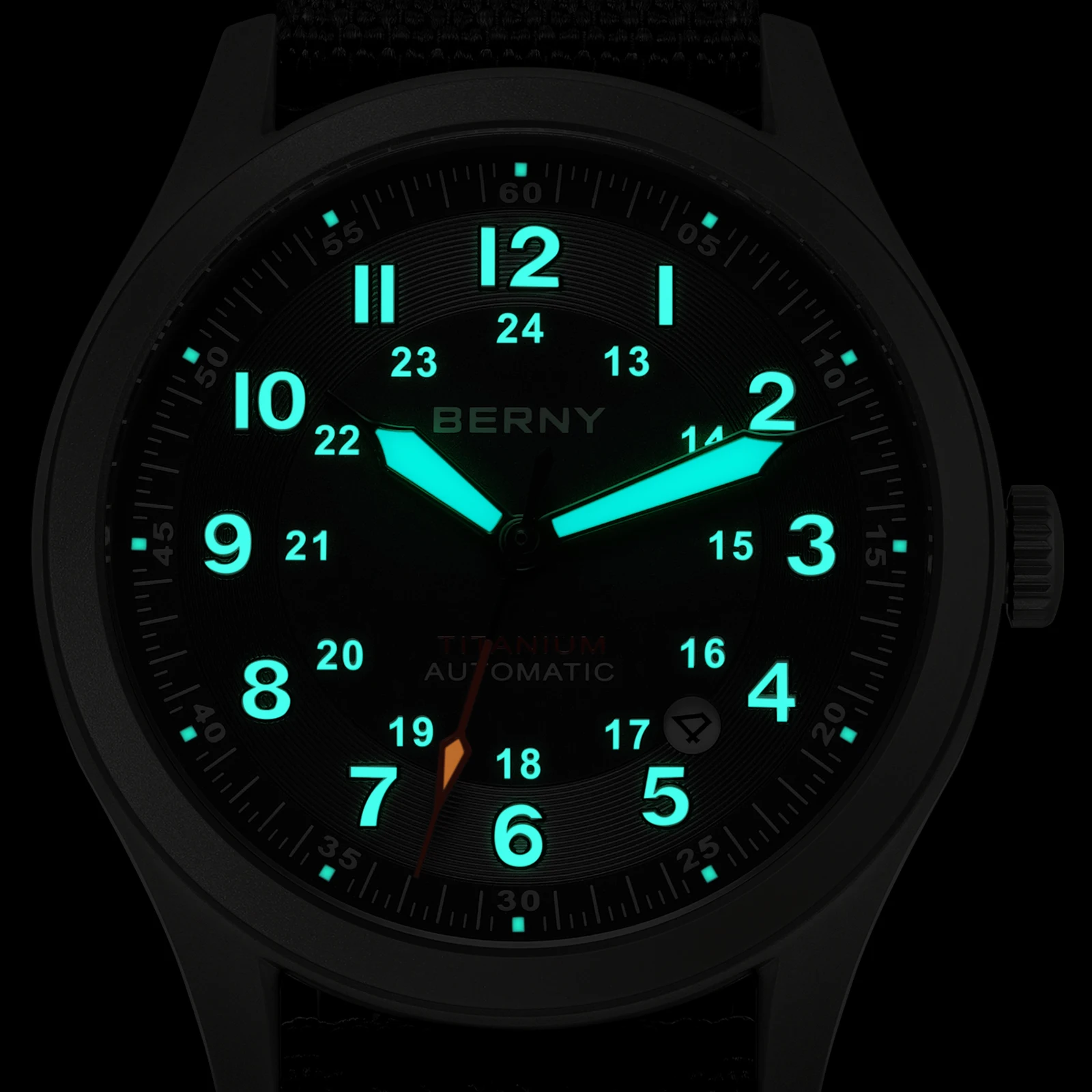
5. Potential Drawbacks of Titanium Watches
Despite its many advantages, titanium watches come with certain limitations worth considering before making a purchase. Understanding these potential drawbacks ensures realistic expectations and helps determine if titanium aligns with your specific needs.
1. Higher Initial Cost
Titanium watches typically command a price premium over their stainless steel counterparts. This increased cost stems from several factors:
– More complex extraction and refinement processes
– Specialized manufacturing techniques required for machining
– Greater difficulty in achieving certain finishes
– Lower production volumes compared to steel models
On average, expect to pay 20-30% more for a titanium version of the same watch model. While this represents a significant upfront investment, many owners find the unique benefits justify the premium.
2. Surface Scratch Susceptibility
Perhaps the most discussed limitation of titanium is its susceptibility to surface scratches. Despite its strength, untreated titanium (particularly Grade 2) has a lower surface hardness than hardened steel. This creates an interesting paradox:
– Titanium watches resist structural damage and dents exceptionally well
– However, they can show surface scratches more readily than steel
– These scratches appear as bright marks against the darker titanium surface
– Many premium manufacturers now apply hardening treatments to address this issue
It’s important to note that while scratches may be more visible, they typically don’t affect the structural integrity of the watch. The overall durability of titanium remains excellent despite this cosmetic consideration.
3. Refinishing Challenges
When scratches do occur, titanium presents unique challenges for restoration:
– Standard polishing techniques used for steel are less effective on titanium
– Professional refinishing requires specialized equipment and expertise
– DIY scratch removal is significantly more difficult than with steel watches
– Service costs may be higher for titanium watch case refinishing
These factors make titanium watches better suited for those who either embrace the natural aging process of their timepiece or are particularly careful about avoiding scratches in the first place.
4. Subjective Weight Perception
While titanium’s lightness is objectively an advantage, some watch enthusiasts subjectively associate weight with quality and value. This perception issue means:
– New titanium watch owners may initially perceive the watch as feeling “less substantial”
– The psychological adjustment period can take time for those accustomed to heavier watches
– Some collectors prefer the solid, weighty feel of traditional steel or gold watches
This is entirely subjective and typically resolves as wearers adjust to and appreciate the comfort benefits of reduced weight.
5. Limited Finishing Options
Titanium’s physical properties create certain aesthetic limitations:
– Achieving and maintaining a high-polish finish is more difficult than with steel
– Most titanium watches feature brushed, blasted, or matte finishes
– The color range is more limited (typically gray with slight variations in tone)
– Special coatings or treatments are required for alternative colors or finishes
For those specifically seeking highly polished or colorful watches, these limitations may be significant considerations.
Understanding how these factors might affect long-term enjoyment of automatic watches helps set appropriate expectations regarding maintenance and appearance over time.
6. Titanium vs. Stainless Steel: Direct Comparison
When deciding between titanium and stainless steel for a quality timepiece, several key factors deserve consideration. This side-by-side comparison highlights the essential differences to inform your choice.
| Property | Titanium | Stainless Steel | Practical Implication |
|---|---|---|---|
| Weight | 4.5 g/cm³ (45% lighter) | 7.9 g/cm³ | Titanium provides noticeably greater comfort during all-day wear |
| Strength | Excellent tensile strength | Very good tensile strength | Both materials offer sufficient strength for daily use |
| Surface Hardness | Lower (150-380 HV depending on grade/treatment) | Higher (220+ HV) | Steel generally shows fewer surface scratches from daily wear |
| Corrosion Resistance | Exceptional (forms protective oxide layer) | Very good (can still corrode in certain conditions) | Titanium performs better in marine environments and with perspiration |
| Hypoallergenic Properties | Excellent (nickel-free) | Good (but contains nickel) | Titanium is the clear choice for those with metal sensitivities |
| Initial Cost | 20-30% higher | Standard pricing | Steel offers better value for cost-conscious buyers |
| Aesthetic Options | Limited (primarily matte/brushed finishes) | Versatile (high polish to matte) | Steel provides more varied aesthetic possibilities |
| Maintenance | More specialized, difficult to refinish | Easier to maintain and refinish | Steel is more forgiving of scratches and easier to restore |
| Thermal Comfort | Excellent (low thermal conductivity) | Poor (high thermal conductivity) | Titanium feels warmer against the skin in cold conditions |
| Weight Distribution | May feel top-heavy with certain designs | Balanced weight distribution | Steel can sometimes provide better stability on the wrist |
These differences become particularly apparent in specialized watches like automatic field and military timepieces, where weight, durability, and comfort significantly impact performance and user experience.
The ideal choice ultimately depends on your personal priorities:
– If comfort, weight, corrosion resistance, and hypoallergenic properties are paramount, titanium excels
– If scratch resistance, initial cost, and aesthetic versatility matter most, steel may be preferable
– For professional use in harsh environments, titanium’s benefits often outweigh its drawbacks
7. Who Benefits Most from Titanium Watches?
Certain individuals stand to gain particular advantages from choosing titanium timepieces. Understanding if you fall into one of these categories can help determine if the titanium premium is justified for your specific needs.
People with Sensitive Skin or Metal Allergies
Titanium’s biocompatible, nickel-free composition makes it the ideal choice for those who experience skin irritation, redness, or allergic reactions to conventional watch metals. The hypoallergenic properties ensure comfortable wear without compromise.
Active Individuals and Sports Enthusiasts
Those with active lifestyles benefit significantly from titanium’s combination of lightweight comfort and structural durability. Whether hiking, swimming, or engaging in high-impact activities, titanium watches provide:
– Reduced wrist fatigue during extended activities
– Exceptional resilience against impacts and harsh conditions
– Superior corrosion resistance during sweaty workouts or water sports
– Less noticeable weight during dynamic movements
All-Day Professional Wearers
People who wear watches continuously throughout demanding workdays appreciate titanium’s comfort benefits. Healthcare professionals, executives, pilots, and others who rely on their timepieces for extended periods find the reduced weight prevents wrist fatigue.
Those in Harsh Environmental Conditions
Individuals regularly exposed to corrosive environments—including maritime workers, swimmers, and those in humid climates—benefit from titanium’s exceptional resistance to saltwater, chemicals, and moisture. The material’s durability in these conditions extends the watch’s functional lifespan.
Modern Aesthetic Enthusiasts
Collectors and enthusiasts who appreciate contemporary design language and technical materials often gravitate toward titanium. The distinctive matte gray finish and industrial character complement modern watch designs and represent advanced materials science.
Travelers and Weight-Conscious Minimalists
Those who value efficiency in their gear selections appreciate titanium’s weight savings, especially when traveling or minimizing bulk. Every gram matters for some users, making titanium’s lightweight nature a significant advantage.
For those seeking specialized performance in demanding conditions, titanium rugged watches deliver exceptional durability while maintaining the material’s signature comfort advantages.
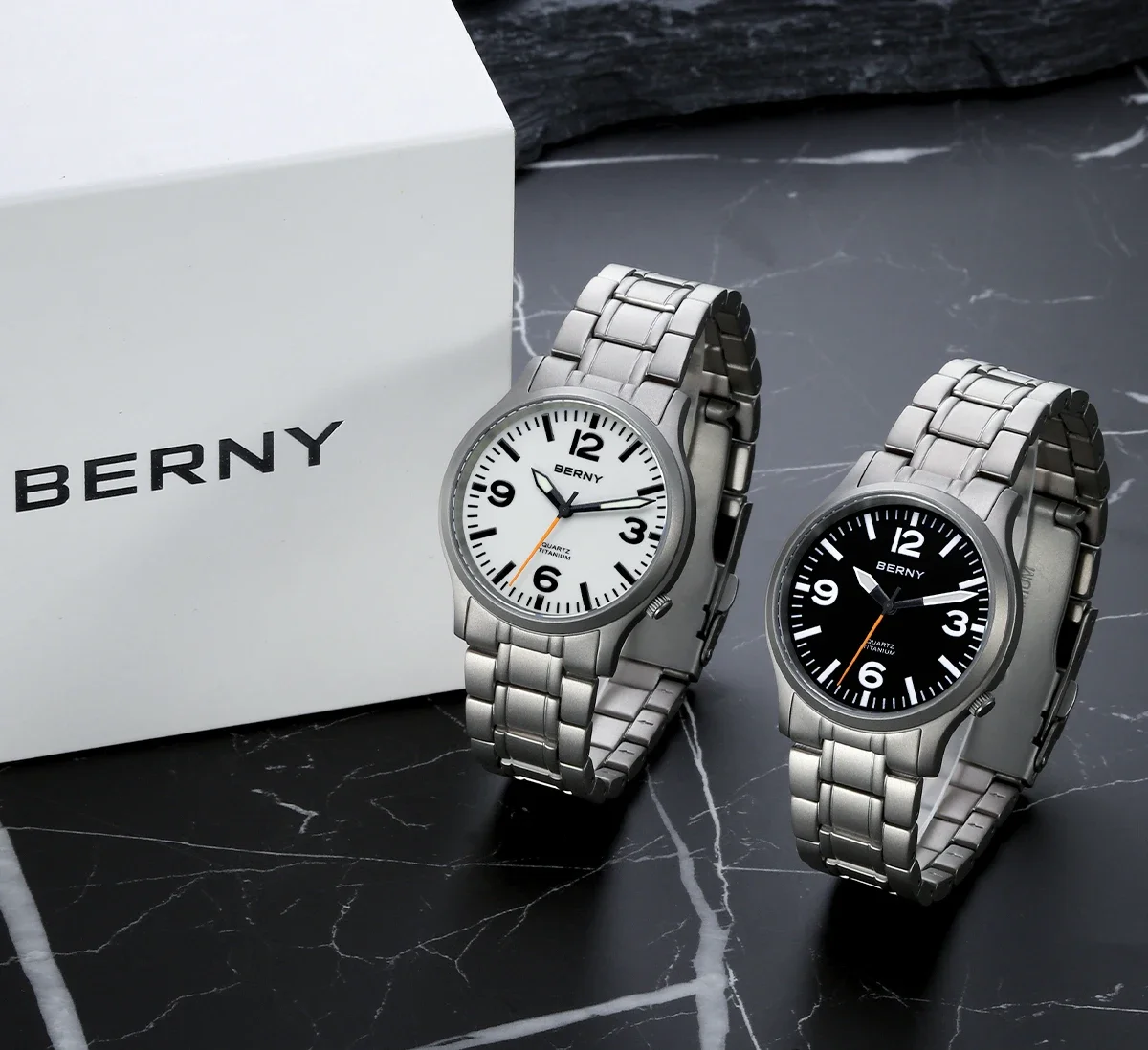
8. Essential Buying Considerations for Titanium Timepieces
When shopping for a titanium watch, several key factors deserve special attention to ensure you select a timepiece that will provide lasting satisfaction.
Titanium Grade and Surface Treatments
Not all titanium watches offer equal performance. Look for:
– Specification of titanium grade (Grade 5 offers superior hardness)
– Mention of surface hardening treatments or coatings
– Terms like “hardened titanium,” “super titanium,” or similar proprietary technologies
– Evidence of scratch-resistant surface treatments
The presence of these features can significantly impact long-term appearance and durability.
Design Elements That Complement Titanium
Certain design choices work particularly well with titanium’s properties:
– Integrated bracelets that leverage the lightweight comfort
– Larger case sizes that would be uncomfortable in heavier metals
– Technical, modern aesthetic that aligns with titanium’s industrial character
– Brushed or sandblasted finishes that hide minor scratches effectively
Value Proposition Assessment
Consider the specific value titanium brings to your chosen watch:
– Is the price premium justified by meaningful functional benefits?
– Does the model take full advantage of titanium’s unique properties?
– Are alternative materials available at different price points?
– How does the particular model’s execution of titanium compare to competitors?
Maintenance and Service Considerations
Factor in long-term ownership aspects:
– Availability of specialized service for titanium cases and bracelets
– Brand reputation for titanium quality and execution
– Warranty coverage for titanium-specific issues
– Expected aging characteristics and patina development
These considerations become particularly relevant when evaluating military-inspired automatic watches, where material choice significantly impacts both aesthetics and performance.
9. Are Titanium Watches Worth the Premium?
When weighing titanium’s value proposition against its higher cost, the answer depends largely on your individual priorities, lifestyle, and how you’ll use the watch.
For many wearers, titanium’s benefits clearly justify the premium, particularly when:
– You’ll wear the watch for extended periods or during active pursuits
– You have sensitive skin or metal allergies
– You prioritize comfort over scratch resistance
– You appreciate the distinctive aesthetic of titanium
– You frequently expose your watch to corrosive environments
The additional investment becomes more questionable when:
– You rarely wear watches for more than a few hours at a time
– You’re particularly concerned about visible scratches
– You prefer the substantial feel and weight of traditional metals
– You frequently change watches rather than wearing one continuously
Ultimately, titanium represents a specific set of tradeoffs that align better with some users than others. The material’s implementation in contemporary timepieces follows a broader pattern of innovation seen in the evolution of dive watch technology, where material advancements address specific performance needs.
Military Inspired Automatic Watches, Rugged Automatic Watches, Tactical Automatic Watches
Price range: $852.14 through $994.60 Select options This product has multiple variants. The options may be chosen on the product pageBronze Automatic Watches, Military Inspired Automatic Watches, Professional Spec Dive Watches
Price range: $1,442.21 through $1,442.82 Select options This product has multiple variants. The options may be chosen on the product pageProfessional Spec Dive Watches, Titanium Automatic Watches
$574.74 Select options This product has multiple variants. The options may be chosen on the product pageClassic Pilot Watches, Military Inspired Automatic Watches
$561.00 Select options This product has multiple variants. The options may be chosen on the product pageRugged Automatic Watches, Unique Automatic Watches
Price range: $228.96 through $231.10 Select options This product has multiple variants. The options may be chosen on the product pageClassic Field Watches, Military Inspired Automatic Watches
Price range: $280.87 through $338.51 Select options This product has multiple variants. The options may be chosen on the product page
10. Common Questions About Titanium Watch Durability
Do titanium watches scratch more easily than steel?
While titanium has excellent structural strength, untreated titanium (especially Grade 2) has lower surface hardness than hardened stainless steel. This means titanium can show surface scratches more readily during daily wear. However, these scratches are typically superficial and don’t compromise the watch’s structural integrity. Many premium manufacturers now apply special hardening treatments or coatings to titanium surfaces to address this limitation.
Can titanium watches be polished when scratched?
Titanium presents more challenges for refinishing than stainless steel. Standard polishing techniques are less effective on titanium, and proper restoration requires specialized tools and expertise. While professional watchmakers can improve the appearance of scratched titanium, achieving the original finish is more difficult than with steel watches. This makes titanium better suited for those who either embrace the natural aging process or take particular care to avoid scratches.
How long do titanium watches typically last?
With proper care, titanium watches can last generations. Titanium’s exceptional corrosion resistance actually gives it potential longevity advantages over steel in harsh environments or with exposure to body chemistry. The material does not degrade over time, and its strength characteristics remain stable. The limiting factors for longevity are typically the movement and other components rather than the titanium case itself.
Does titanium maintain its appearance over time?
Titanium develops a subtle patina with age and wear, but maintains its overall appearance remarkably well. Unlike some metals that tarnish or oxidize significantly, titanium’s natural oxide layer protects it from major changes. The most noticeable evolution comes from surface marks that accumulate over time, which many enthusiasts consider part of the watch’s character and story.
For specialized applications where extreme conditions are expected, heat resistance in titanium watch cases provides additional durability benefits worth considering.
11. Caring for Your Titanium Timepiece
Proper maintenance ensures your titanium watch remains in optimal condition for years to come. These specialized care techniques help preserve both function and appearance.
Regular Cleaning Routine
- Rinse with fresh water after exposure to saltwater or chemicals
- Clean with mild soap and water using a soft cloth or soft-bristled brush
- Pay special attention to crevices between links and around the case back
- Dry thoroughly before storage to prevent water spots
- Avoid harsh chemicals, especially those containing chlorine or bleach
Preventing Surface Scratches
- Remove the watch before activities likely to cause impacts or abrasions
- Store separately from other metal objects that could scratch the surface
- Consider protective cases for travel or storage
- Handle by the strap rather than the case when possible
- Be mindful of contact with rough surfaces or abrasive materials
Professional Maintenance
- Schedule regular water resistance checks if used for swimming/diving
- Have movement servicing performed by qualified technicians familiar with titanium
- Consider professional cleaning for bracelet articulation points
- Consult the manufacturer before attempting any DIY repairs or adjustments
- Seek specialized expertise for any case or bracelet refinishing
Products and Tools for Titanium Care
- Use microfiber cloths rather than paper products for cleaning
- Apply silicon-impregnated cloths sparingly to maintain luster
- Avoid metal polishes designed for steel or silver
- Consider cape cod cloths for minor surface improvement (test in inconspicuous area first)
- Ultrasonic cleaners are generally safe for titanium (remove movement first)
These maintenance practices are particularly relevant for professional specification dive watches where proper care ensures continued performance in demanding conditions.
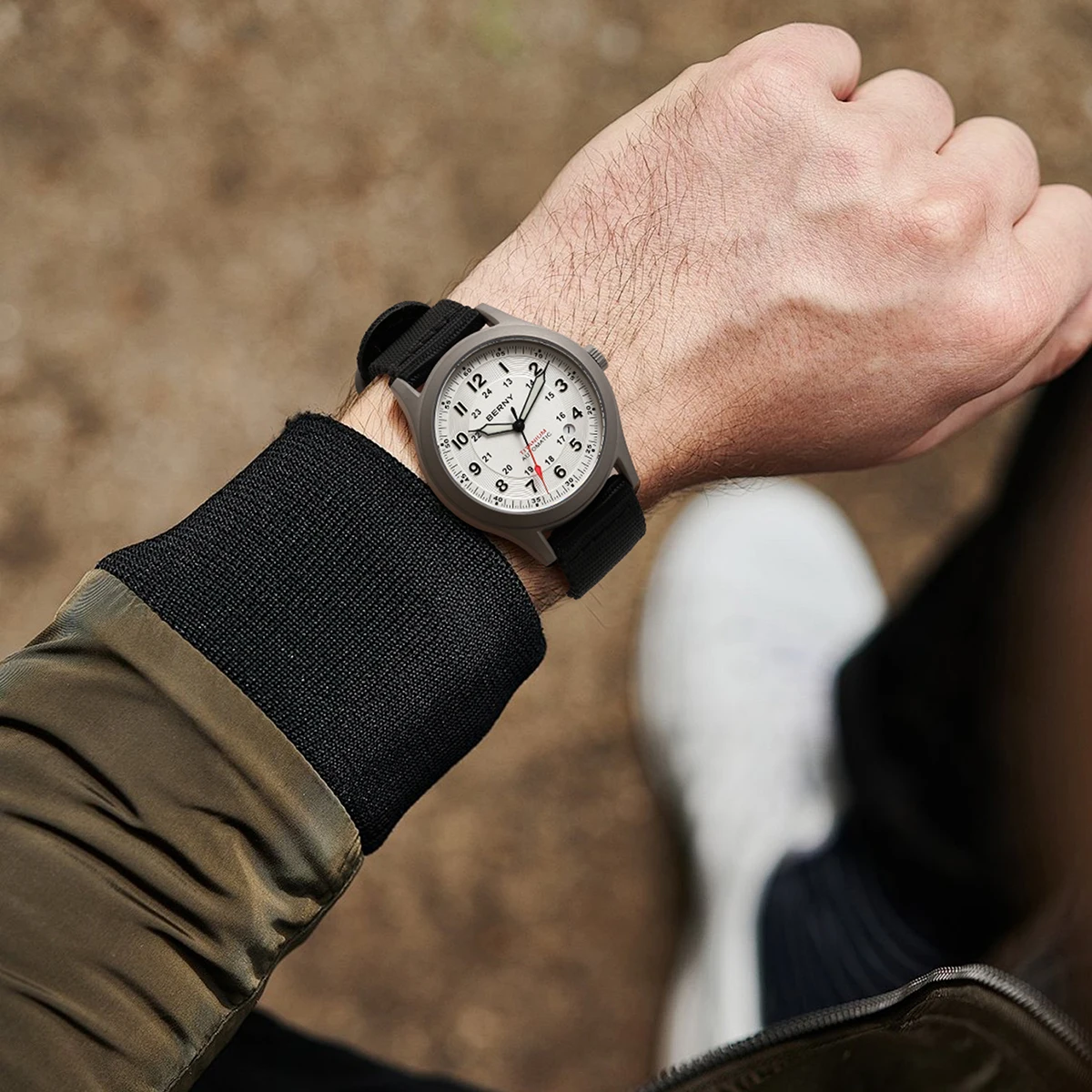
12. Is Titanium Right for Your Next Watch? Final Assessment
After examining titanium’s distinct properties, advantages, and limitations, you can now make an informed decision about whether this material aligns with your needs and preferences for a fine timepiece.
Titanium makes an excellent choice when:
– Comfort and wearability are top priorities in your selection criteria
– You have an active lifestyle that would benefit from reduced weight
– Corrosion resistance matters due to your environment or activities
– You have sensitive skin or metal allergies that limit other options
– The modern, technical aesthetic complements your style preferences
Steel might be more suitable when:
– Scratch resistance is particularly important to your wearing habits
– You prefer the substantial feel and weight of traditional watch metals
– Cost-effectiveness is a primary consideration in your purchase
– You specifically desire high-polish finishing options
– You anticipate frequent refinishing needs due to your usage patterns
Remember that while material choice is important, it represents just one aspect of a quality timepiece. Movement quality, design cohesion, brand heritage, and personal connection should all factor into your final decision. The best watch is ultimately one that brings you satisfaction each time you wear it, regardless of its case material.
The evolution of materials in fine watchmaking continues to expand our options as enthusiasts, following patterns seen throughout the history and evolution of professional diving watches. Today’s titanium timepieces represent the perfect marriage of traditional craftsmanship with modern materials science—creating watches that are both technically advanced and historically grounded.

